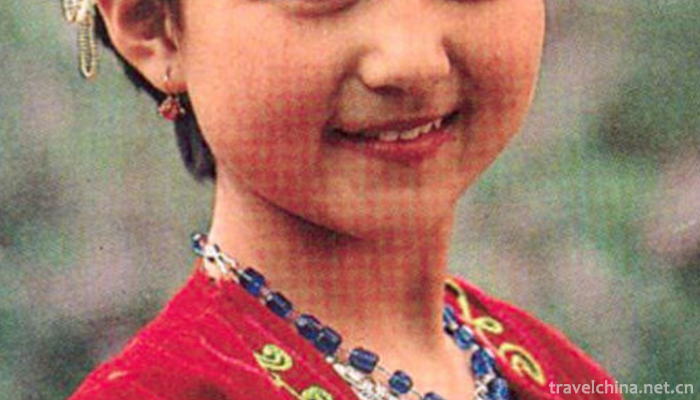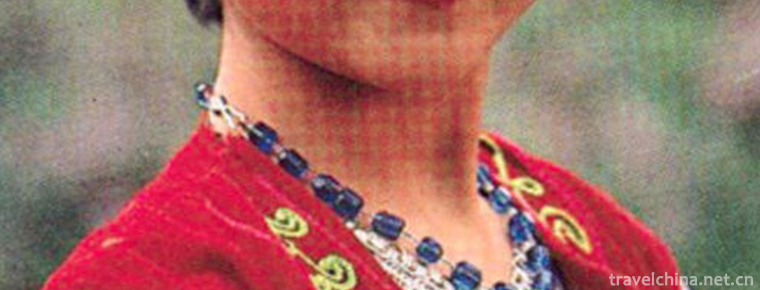Kazakh Costume
Kazakh Costume
Kazakh people are characterized by pastoral nomadic culture. Their clothes are easy to ride. Their national clothes are mostly made of sheep's skin, fox's skin, deer's skin and wolf's skin, reflecting the life characteristics of the mountain grassland people.
Historically, the vast majority of Kazakhs lived a nomadic life, which was driven by water and grass. Therefore, their clothes were characterized by a strong grassland animal husbandry life. Pastoral democracy uses the fur of livestock as raw material for clothing. Kazakh men like to wear cotton sweaters and pants, like to use plush, gabardine and other clothing. Black, coffee and other dark colors are mostly used in color. In winter, they mainly wear leather coats and pants. Selected materials are mainly sheep's skin, but also wolf's skin, fox's skin or other precious animal skins. For ease of mounting and dismounting, trousers are sewn with sheepskin to make crotch trousers, so they are broad, strong and durable. Most shirts are high collars with embroidered lace. Shirt jacket shoulder, shoulder wear short clothes, sometimes also wear "loops". Family Honorary Produce on July 10, 2015 .
On June 7, 2008, Xinjiang Uygur Autonomous Region and Yili Kazakh Autonomous Prefecture jointly declared "Kazakh costumes" which were approved by the State Council of China and included in the second batch of national intangible cultural heritage list.
Clothes & Accessories
Men's style
Men wear Pullover shirts with high collars. Young people wear embroidered colored patterns on their collars. They wear Western vest, outside.
Wear a cloth or fur coat, belt around waist, knife on top, easy to eat, wear jacket leather trousers for riding, wear caps in winter, spring, summer and autumn. In winter and spring, the cap is made of fox or lamb skin, with two ear fans on the left and right, a long tail fan on the back and four edges on the top. The cap can cover the snow and cold. In summer and autumn, the cap is made of lamb hair, white felt cap, and the flanging of the cap is made of black velvet. The cap is both rain-proof and heat-proof. Men wear shoes and boots made of leather.
Female style
Kazakh women's clothing is colorful. They like to use white, red, green, light blue satin, flower cloth, wool textiles and other raw materials to make dresses, young girls and young women generally wear sleeves embroidered, with a multi-layer lotus leaf hem dress. Wear shoulder or jacket in summer, cotton jacket in winter and cotton overcoat when going out. Women are most particular about hats and headscarves. The unmarried girl wears a beautiful triangular or square headscarf in summer, and a hard-shell dome cap with owl feathers in winter, which symbolizes bravery and firmness. When the bride wears a pointed hat with embroidery and gold and silver jewelry decoration, and a string of beads hanging in front of her face. A year later, she wears a flowery headscarf and a shawl when she has children.
Hat
Winter hat
A pointed quadrilateral cap made of fox or lamb skin
Autumn hat
White felt hat made of lamb hair
Brief Description of Kazakh Nationality
Chinese Kazakhs (Slavic: Kazakh: maple k, Arabic: Kazakh) are ethnic minorities of China with a population of about 1.4 million. The world's population of Kazakhstan is about 18 million. Kazakhs in China are mainly distributed in Xinjiang Uygur Autonomous Region. The Kazakh language they use is the Arabic alphabet Kazakh, and Kazakhstan uses the Slavic alphabet Kazakh. Kazakh is the main ethnic group in Kazakhstan, and the ethnic minorities of Russia, Uzbekistan and Turkey.


-
1.Taihang Grand Canyon
Linzhou Taihang Grand Canyon, located in the northwest of Henan Province and Linzhou City in the eastern foot of the southern Taihang Mountains
Time 2018-12-09 -
2.Guangdong First Peak Tourist Scenic Spot
Guangdong First Peak Tourist Scenic Area is the largest oasis on the Tropic of Cancer. It has a large area of primitive forests, stable forest ecosystem, dense evergreen broad-leaved forests
Time 2019-01-13 -
3.Yangtze River Source of Tuotuo River
Tuotuo River: Located in Tanggula Mountain Town, Southern Region of Golmud City, Qinghai Province, it is the West source of the Yangtze River, south of the Hoh Xili Mountains.
Time 2019-02-22 -
4.Ansai waist drum
Ansai waist drum is a traditional folk dance in Shaanxi Province. Performances can be performed by several people or thousands of people together, magnificent momentum, exquisite performance is intoxi
Time 2019-03-31 -
5.Traditional Manufacturing Techniques of Bean Flap
Douban traditional craftsmanship, Pixian County, Sichuan Province, local traditional craftsmanship, one of the national intangible cultural heritage.
Time 2019-04-28 -
6.Jinhua Taoism
Jinhua Daoqing is also known as singing news and persuading Shiwen. It is a traditional rap art in Zhejiang Province. It combines with Hangzhou gongshu, Wenzhou drum lyrics, Ningbo
Time 2019-05-06 -
7.Cross stitch
Flower picking, a kind of drawing work, also refers to a needle method of embroidery, Chinese folk traditional handicraft. Also known as "pick weave", "cross embroidery", "cro
Time 2019-06-21 -
8.Couplet Custom
Couplet is a couplet inscribed on the pillar of the couplet, also refers to the couplet, is a unique form of literature and art in China. The custom of couplets originated from the dual phenomenon of
Time 2019-07-14 -
9.Zhang Daqian
Zhang Daqian (Chang Dai-Chien, May 10, 1899 - April 2, 1983), formerly known as Zheng Quan, was renamed as yuan, Ji Yuan, Hao Da, alihao Dai Ju Shi, Xia Li Hong Kong people, Zhai Da Feng Tang. Sichuan
Time 2019-09-04 -
10.Beijing Police College
Beijing Police College is a full-time general undergraduate college approved by the Ministry of Education, sponsored by the Beijing Municipal People's Government, administered by the Beijing Public Se
Time 2019-09-06 -
11.Tips for Chengdu TourismTime 2020-11-28
-
12.Suining history and culture
As a place name, "Suining" began in the Eastern Jin Dynasty. The Eastern Jin Dynasty coexisted with the Sixteen States, while Suining belonged to the Chenghan state. At that time, the rulers of various countries had been fighting with each other for years
Time 2020-12-16